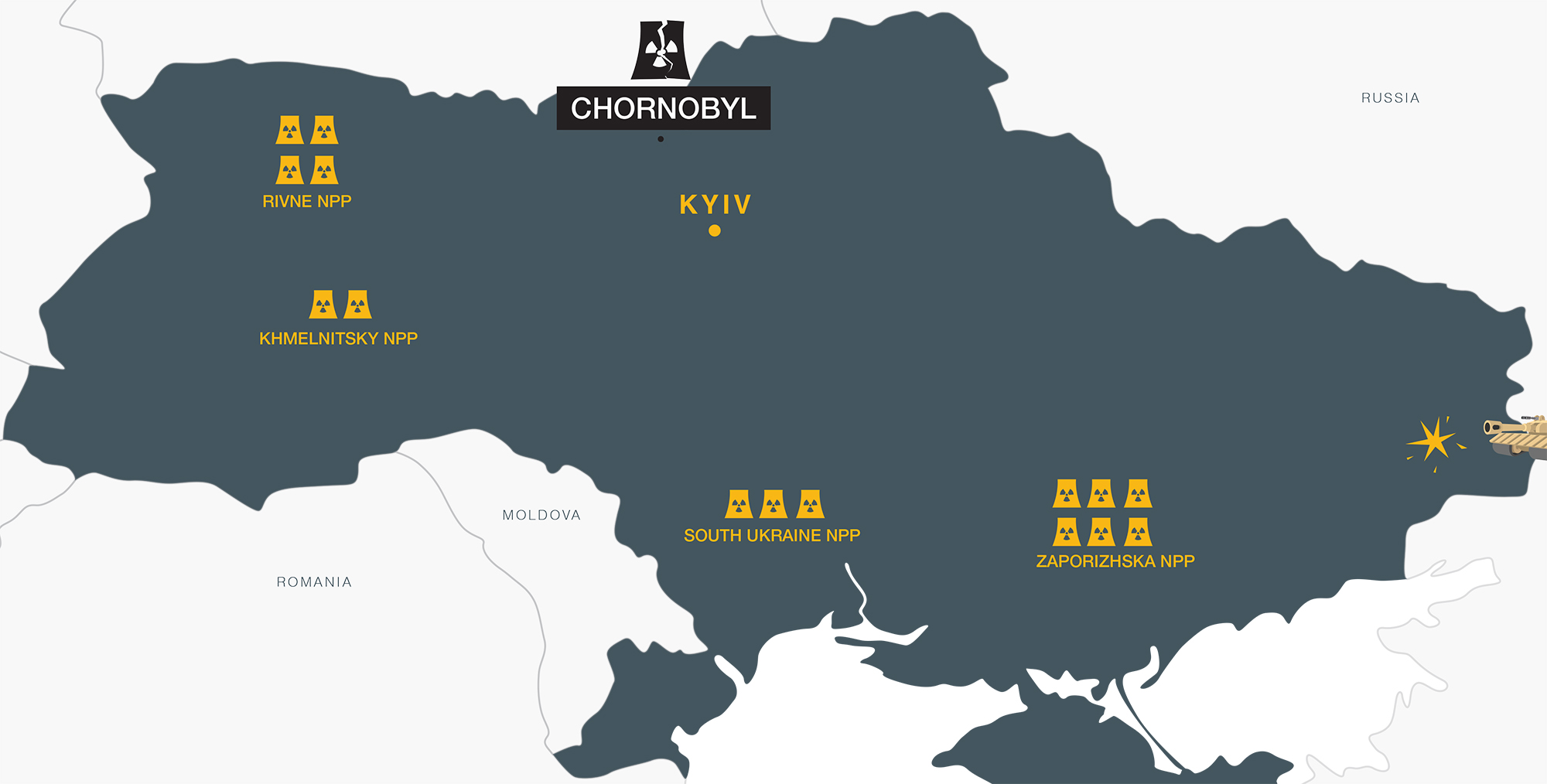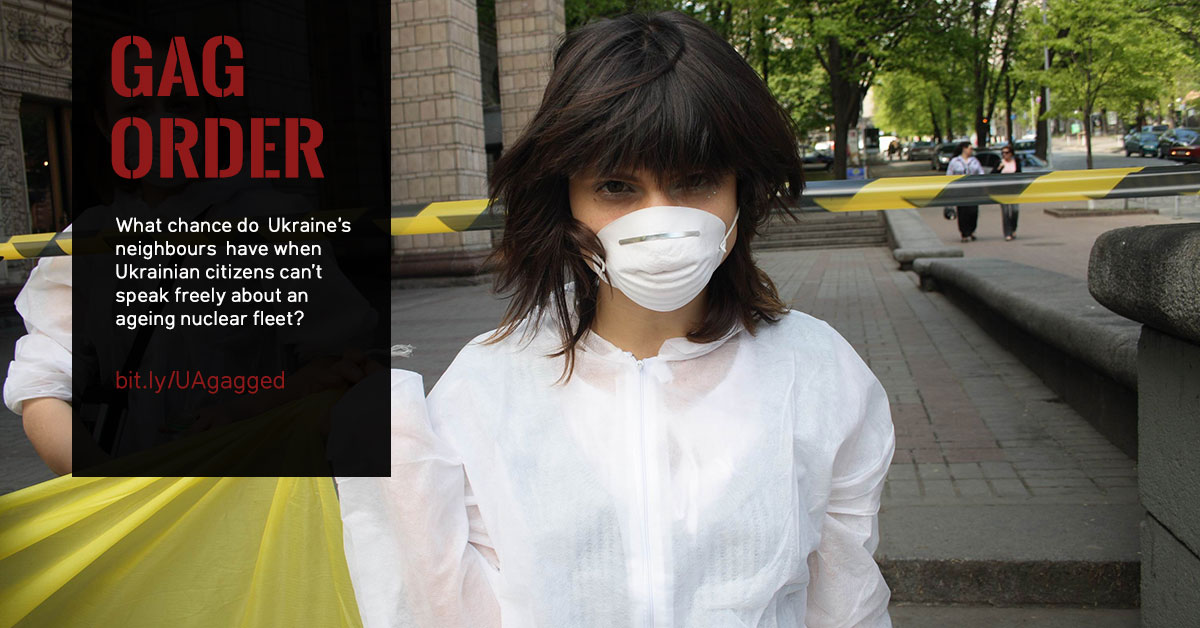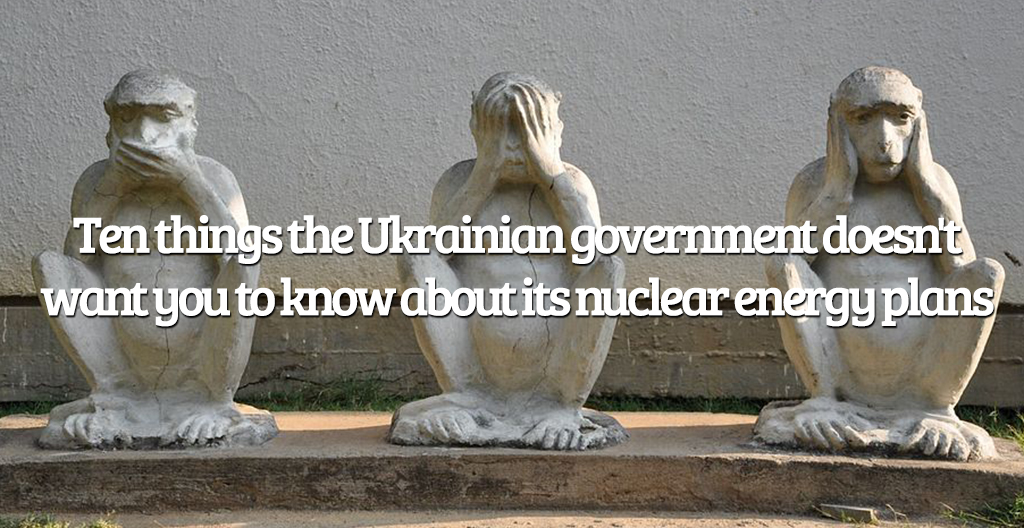ARCHIVED: Zombie reactors in Ukraine
While the European Union is trying to help Ukraine’s political transition, Europe’s financial support is cementing the country’s dependence on an outdated and highly unsafe nuclear sector. To avoid further instability and political and environmental risks, European institutions need to offer better oversight and funding for alternative energy sources.

Stay informed
We closely follow international public finance and bring critical updates from the ground.
Key facts
Ukraine’s so-called ‘nuclear safety upgrade programme’ is necessary to keep Ukraine’s ageing nuclear reactors working longer than they were designed to. Costs: estimated with EUR 1.45 billion Public financing: EUR 600 million (300m each from Euratom and EBRD), partially disbursed Bankwatch calls on European institutions to re-direct their funding towards safer and sustainable energy solutions.
Meet our campaigners Iryna Holovko, Campaign lead, Ukraine Dana Marekova, Slovakia Ana-Maria Seman, Romania Akos Eger, Hungary
Key issues
- Design lifetime of 12 soviet-era nuclear reactors ends before 2020. Six lifetimes already prolonged, same is planned for the rest. more >>
- The safety of Ukraine’s reactors cannot be guaranteed: vicinity to armed conflict, accidents and safety issues. more >>
- EUR 600 million from European institutions supports programme crucial for these plans. more >>
- Government is stifling dissent, breaching international law. Potential implications for Ukraine’s transition and EU relations. more >>
- Supply and disposal of nuclear fuel mean continued dependence on Russia more >>
Background
Teaser trailer for “No safe atom”. Turn on subtitles in the settings on the bottom right. Watch the full 11 minute film on YouTube >>
Ukraine's nuclear timebomb
Ukraine has 15 soviet-era nuclear reactors built during Soviet times. 12 were designed to be shut down by 2020.
Kyiv is determined to keep all reactors running for at least ten years beyond their expiry date.
The lifetimes of six reactors have already been expanded without completing necessary safety upgrades, without properly assessing all risks and without considering sustainable alternatives.
Read more:
Europe’s false solutions for Ukraine’s energy woes
Blog post | March 9, 2016
Safety cannot be guaranteed
Europe’s biggest nuclear power plant in Zaporizhia is located only 250 kilometres from the frontlines of the ongoing armed conflict in eastern Ukraine.
Video: Sergei Shygyn, chief specialist for nuclear reactors at the Zaporizhia nuclear power plant confirms that the plant was not designed to withstand a war.
Read more:
Ukraine Nuclear Safety Upgrade Programme: loan conditions not met
Briefing | January 21, 2016
Europe's support for Ukraine's nuclear gamble
Two European public lenders, Euratom and the European Bank for Reconstruction and Development, approved loans over EUR 300 million each for a so-called ‘safety upgrade’ project necessary to keep Ukraine’s ageing nuclear reactors running.
For comparison, EUR 600 million is nearly a quarter of the total EU support (excluding Euratom) to Ukraine’s energy sector between 2007-2014.
What is worse, Ukraine unilaterally decided to postpone the safety upgrades. While safety is being delayed, the ageing reactors continue their operations.
Read more:
Ukraine snubs safety concerns and European donors, extends lifetime of fourth Soviet-era nuclear reactor
Press release | December 8, 2015
Stifled dissent, no public control
Despite the EU’s financial support, Ukraine’s government gets away with stifling dissent and breaching international law. This could have far reaching implications for Ukraine’s transition and its relations with EU countries and the EU.
Breach of international law
In April 2013, the UN Espoo monitoring body ruled that Ukraine had breached the Espoo Convention when extending the licenses for two units at the Rivne nuclear power plant. The decision was taken without a transboundary environmental impact assessment (EIA) and without informing neighbouring countries about the plans, as Espoo procedures would require.
The governments of Slovakia, Romania, and Hungary have asked Ukraine for information on its nuclear power plans, requesting Ukraine to initiate public consultations in neighbouring countries. So far, Ukraine denies these requests (see responses to Slovakia and Hungary).
Also the European Commission stated in a letter (pdf) that Ukraine must adhere to the Aarhus and Espoo conventions. So far, however, it has taken no steps to make Ukraine’s government comply.
Read more:
Ukraine’s Nukes Are in Breach of UN Convention
Press release | April 22, 2013
Letter to Marco Buti, Director General for Economic and Financial Affairs (pdf)
Policy letter | August 10, 2015
Stifling dissent
In 2015, Ukraine’s state-owned nuclear operator Energoatom sued civil society organisation National Ecological Centre of Ukraine (NECU), alleging that NECU had published misleading information about safety standards at unit 2 of the South Ukraine nuclear power plant. Bankwatch’s member group NECU was forced to post a retraction on its website.
Despite the case attracting international attention, the Ukrainian government appears keen to block public debate, both at home and abroad.

Dependence on Russia
Ukraine’s dependence on Russian gas supplies is often used to defend the support for nuclear energy. But all of Ukraine’s nuclear reactors use Russian technology and nuclear fuel from Russia. Despite efforts to diversify with with America’s Westinghouse, Russian fuel is still used at all nuclear units in Ukraine.
Spent fuel is sent back to Russia, providing ample opportunity for Russia to put pressure on Ukraine, which has so far built no infrastructure for the long-term, safe isolation of spent fuel and radioactive waste produced during the reprocessing of spent fuel in Russia.
Latest news
Cu ochii pe reactoarele de la Cernavodă
Bankwatch in the media | 29 April, 2016Cu cele două reactoare nucleare ale sale, România nu poate sta departe de controversele legate de explozia de la Cernobîl. Mii de români au suferit din cauza radiaţiilor de acum 30 de ani. Alţii se tem de un posibil nou accident. Autorităţile spun totuşi că în ţara noastră accidentele nucleare sunt imposibile. Pe plan internaţional, terorismul este văzut ca principala ameninţare pentru o centrală atomică, iar în România s-au făcut doar calcule teoretice privind rezistenţa reactoarelor de la Cernavodă.
Read moreDie Ukraine baut auf Atomkraft
Bankwatch in the media | 27 April, 2016Immer noch sterben Menschen in der Ukraine, aber auch den Nachbarstaaten an den Folgen der Havarie in Tschernobyl. Teile der Ukraine und Weißrusslands bleiben nach wie vor kontaminiert. Die Regierung in Kiew setzt aber trotzdem auf Atomkraft – aus Bequemlichkeit, kritisieren die Experten. 15 Reaktoren gibt es insgesamt in der Ukraine. Sie liefern die Hälfte der Elektrizität des osteuropäischen Landes. Für die ältesten Reaktoren, gebaut noch von den Sowjets, planen die ukrainischen Machthaber die Laufzeitverlängerungen. Die Umweltschützer schlagen Alarm.
Read moreАтом и уголь устарели, будущее за возобновляемой энергией, — эксперт НЭЦУ
Bankwatch in the media | 26 April, 2016Эксперт НЭЦУ Алексей Пасюк считает, что приоритетным вопросом в области энергетики Украины является потребление и энергоэффективность. В 30-ую годовщину аварии на ЧАЭС говорим о будущем энергетики в Украине с руководителем топливно-энергетического направления Национального экологического центра Украины Алексеем Пасюком. Ольга Веснянка: Является ли уголь альтернативой атомной энергетике?
Read moreRelated publications
Members of European Parliament ask European Commission to take firm position on nuclear transparency, public engagement and safety across Europe
Advocacy letter | 10 May, 2017 | Download PDFIn this joint letter, 18 members of the European Parliament, Nuclear Transparency Watch and CEE Bankwatch Network are asking the European Commission, as an opinion-making party of relevant international conventions, to provide leadership and express it
Nuclear safety and decommissioning – Update on the EBRD’s Ukraine Safety Upgrade programme
Briefing | 5 May, 2017 | Download PDFSkeletons are hiding in the closet of Europe’s energy policy – letter to Maroš Šefčovič on the EU’s support for nuclear energy
Advocacy letter | 1 December, 2016 | Download PDFAccompanied by a public action, Bankwatch and Global 2000 presented European Commission vice-president Maroš Šefčovič with this open letter. The letter points out the inconsistencies behind European public money supporting lifetime extension of soviet era nuclear reactors in Ukraine, which are made in violation of international environmental conventions and with insufficient implementation of safety requirements. So far, the EU’s support for Ukraine is a bad precedent for nuclear decision-making across Europe. It is time to set things straight!

